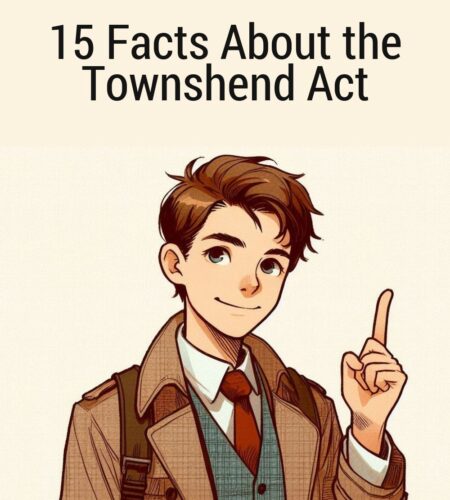The Townshend Acts, a series of British revenue laws, played a pivotal role in the lead-up to the American Revolution. These acts imposed taxes on various imports into the American colonies, leading to increased tension between the colonies and the British government. Let’s delve into 15 intriguing facts about the Townshend Act and its historical significance.
Introduction
The Townshend Acts, passed between 1767 and 1768, were named after Charles Townshend, the Chancellor of the Exchequer in Great Britain. These acts imposed duties on certain goods imported into the American colonies, sparking outrage and resistance among colonists.
Fact 1: Taxation Without Representation
Colonial Outcry: One of the primary grievances of American colonists was “taxation without representation.” The Townshend Acts were viewed as an example of British oppression because the colonists had no representation in the British Parliament.
“No Taxation Without Representation”: This famous slogan became a rallying cry for the American colonists, expressing their belief that they should not be taxed by a government in which they had no voice.
Fact 2: The Items Taxed
Taxed Goods: The Townshend Acts imposed duties on various imports, including glass, paper, paint, lead, and tea. These taxes affected a wide range of everyday items and commodities.
Tea Tax Controversy: While the tax on tea was relatively small, it was particularly controversial due to the symbolism associated with the Boston Tea Party.
Fact 3: John Dickinson’s “Letters from a Farmer in Pennsylvania”
Protest Literature: John Dickinson, a Pennsylvania lawyer and politician, wrote a series of essays known as the “Letters from a Farmer in Pennsylvania.” In these letters, he eloquently argued against the Townshend Acts, emphasizing the principle of no taxation without representation.
Influence on Public Opinion: Dickinson’s writings were widely read and played a significant role in shaping public opinion against the Townshend Acts.
Fact 4: Writs of Assistance
Writs of Assistance: The Townshend Acts included provisions for “writs of assistance,” which allowed British customs officers to search homes and businesses for smuggled goods without specifying what they were looking for or where.
Fourth Amendment Precursor: The writs of assistance controversy laid the groundwork for the Fourth Amendment to the United States Constitution, which protects against unreasonable searches and seizures.
Fact 5: Colonial Boycotts
Colonial Response: American colonists responded to the Townshend Acts with organized boycotts of British goods. They initiated non-importation agreements, refusing to purchase taxed items.
Economic Impact: The boycotts had a significant impact on British merchants, as they experienced a decline in exports to the American colonies.
Fact 6: The Role of Women
Daughters of Liberty: Women played a crucial role in the colonial resistance. Organizations like the “Daughters of Liberty” boycotted British goods and produced homemade alternatives.
Spinning Bees: Some women participated in spinning bees, where they produced homespun cloth as a substitute for British textiles.
Fact 7: The Boston Massacre
Tensions Erupt: The Townshend Acts contributed to escalating tensions in the American colonies. In 1770, the Boston Massacre occurred, resulting in the deaths of several colonists at the hands of British soldiers.
Propaganda and Public Outcry: The Boston Massacre became a symbol of British oppression, and it was widely depicted in colonial propaganda to inflame anti-British sentiment.
Fact 8: Partial Repeal
Partial Repeal in 1770: Due to the growing unrest and economic pressure on British merchants, Parliament decided to partially repeal the Townshend Acts in 1770. The taxes on all items were removed, except for tea.
Tea Tax Persists: The British government retained the tea tax as a symbol of its authority to tax the colonies.
Fact 9: The British Troops in Boston
Occupation of Boston: In response to the growing unrest in Boston, British troops were stationed in the city. The presence of British soldiers further inflamed tensions and contributed to the climate of rebellion.
“Bloodybacks” and “Lobsterbacks”: American colonists often referred to the British soldiers as “bloodybacks” or “lobsterbacks” in a derogatory manner.
Fact 10: Samuel Adams and the Circular Letter
Samuel Adams’ Influence: Samuel Adams, a prominent American revolutionary, played a key role in opposing the Townshend Acts. He authored the Massachusetts Circular Letter, which called for non-importation and protested the taxes.
Parliament’s Response: In response to the Massachusetts Circular Letter, Parliament dissolved the Massachusetts Assembly, further exacerbating colonial grievances.
Fact 11: The New York Non-Importation Agreement
New York’s Role: New York played a crucial role in organizing non-importation agreements. The New York Sons of Liberty helped coordinate these efforts.
Economic Pressure: The New York non-importation agreement put significant economic pressure on British merchants, as it was one of the largest colonial ports.
Fact 12: The Influence of John Locke
Enlightenment Philosophy: The philosophy of John Locke, an influential Enlightenment thinker, heavily influenced American colonists’ arguments against the Townshend Acts. Locke’s ideas on natural rights and government’s role in protecting those rights resonated with the colonists.
The Right to Rebel: Locke’s writings on the right to rebel against oppressive governments were particularly relevant to the colonial resistance.
Fact 13: The Tea Act of 1773
The Continued Tea Tax: Despite the partial repeal of the Townshend Acts, the British government retained the tea tax. The Tea Act of 1773 allowed the British East India Company to sell surplus tea directly to the colonies.
The Boston Tea Party: The Tea Act led to the infamous Boston Tea Party in December 1773, where American colonists, disguised as Mohawk Indians, boarded British ships and dumped tea into Boston Harbor as a protest against the tax.
Fact 14: The Acts’ Repeal
Complete Repeal in 1770: The Townshend Acts were fully repealed in 1770, with the exception of the tea tax.
The Aftermath: Although the Townshend Acts were no longer in effect, their legacy continued to fuel anti-British sentiment and played a role in the lead-up to the American Revolution.
Fact 15: A Prelude to Independence
The Road to Independence: The resistance and protests against the Townshend Acts laid the foundation for the broader movement for American independence. The principles of self-determination and self-governance gained momentum.
Declaration of Independence: These principles eventually found expression in the Declaration of Independence in 1776, marking the formal separation of the American colonies from British rule.
Conclusion
The Townshend Acts, marked by taxation without representation and a wave of colonial protests, played a pivotal role in the American colonies’ journey toward independence. The acts and the events they set in motion, such as the Boston Massacre and the Boston Tea Party, became catalysts for revolution. In retrospect, these 15 facts about the Townshend Acts provide valuable insight into the deep-rooted causes and consequences of the American Revolution, shaping the course of history and the birth of a new nation.
Subscribe to our email newsletter to get the latest posts delivered right to your email.





Comments